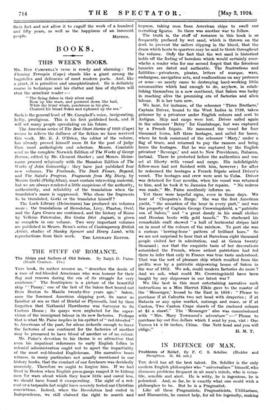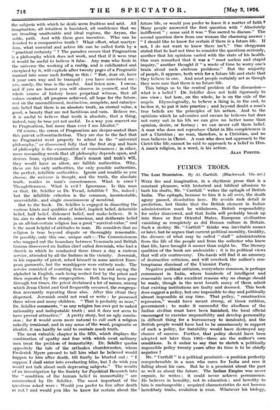IN DEFENCE OF MAN.
Problems of Belief. By F. C. S. Schiller. (Hodder and Stoughton. 38. 6d. net.) THE devil has all the best talent. Dr. Schiller is the only modern English philosopher who " universalizes " himself, who
discusses problems frequent in all men's minds, who is versa- tile, sensible and alert. He is witty, he is ingenious, he is polemical. And, so far, he is exactly what one could wish a philosopher to be. But he is a Pragmatist.
Like all these Pragmatists, Pragmaticists, Utilitarians, and Humanists, he cannot help, for all his ingenuity, making the subjects with which he deals seem fruitless and arid. All imagination, all intuition is banished, all confidence that we are treading unalterable and ideal regions, the Aryan, the noble, path. And with them goes incentive. Who can be levoted to a comparative truth ? What effort, what martyr- dom, what essential and active life can be called forth by a " practical certainty " ? The paradox occurs that Pragmatism is a philosophy which does not work, and that if it were true it would be useful to believe it false. Any man who finds in the universe the working of a reality, and is exhilarated and energized by it, will explode after twenty pages of a Pragmatic manual into some such feeling as this : " But, dear sir, have it your own way and be tranquil : you have convinced me : yes, surely, the true is the useful. And listen now. I swear, and if you are honest you will observe in yourself, and the whole course of history bears perpetual witness, that all values created, all progress achieved, all hope for the future, rest on the unconditioned, instinctive, complete, and cataclys- mic belief that there is an absolute truth, an eternal value, a good, a beauty that are not factitious and vain. Believe me, it is useful to believe that truth is absolute, that a thing, indeed, may be true yet not useful. In a way you convert me to Pragmatism, but more than ever I am Idealist."
Of course, the errors of Pragmatism are deeper-seated than this patent self-contradiction. They are due to the fact that no Pragmatist went properly to school in the " universal philosophy," or discovered fully that the first step and basis of philosophy is the examination of consciousness ; in other, more resounding words that all philosophy depends upon, and
derives from, epistemology. Man's reason and man's will,
they would have us allow, arc fallible authorities. Why, these are his only authorities, the only possible authorities, the perfect, infallible authorities. Ignore and muddle as you choose, the universe is thought, and the truth, the absolute truth, resides in man's consciousness. What is error ? Thoughtlessness. What is evil ? Ignorance. Is this man or that, Dr. Schiller or Dr. Freud, infallible ? No, indeed ; but the infallible criterion is the common, incontestable, unavoidable, and single consciousness of mankind.
But to the book. Dr. Schiller is engaged in dissecting the various kinds and qualities of belief, implicit belief, debatable belief, half belief, dishonest belief, and make-believe. It is his aim to show that steady, conscious, and deliberate belief in an all-but-certain religion has a good " survival-value," and is the most helpful of attitudes to man. He considers that no religion is true beyond dispute or thoroughly reasonable. Or possibly, only this one, unique cult :—The Commissioners who mapped out the boundary between Venezuela and British Guiana discovered an Indian chief called Jeremiah, who had a church in which he conducted three times a day a curious service, attended by all the Indians in the vicinity. Jeremiah, in his capacity of priest, robed himself in some ancient Euro- pean garments, but the worshippers were entirely nude. The service consisted of counting from one to ten and saying the alphabet in English, each being recited first by the priest and then repeated by the congregation. Both having been gone through ten times, the priest declaimed a lot of names, among which Jesus Christ and God frequently occurred, the congrega- tion reverently repeating these also. After this ritual they dispersed. Jeremiah could not read or write : he possessed three wives and many children. " That is probably as near," Dr. Schiller comments, " as any religion has ever got to naked rationality and indisputable truth ; and it does not seem to have proved attractive." A pretty story, but an ugly conclu- sion ; for it would seem more natural to call such a religion nakedly irrational, and in any sense of the word, pragmatic or idealist, it can hardly be said to contain much truth.
The most valuable chapter is the fifth, which displays the combination of apathy and fear with which most ordinary men treat the problem of immortality. Dr. Schiller quotes appositely the tale of the orthodox churchwarden, whom Frederick Myers pressed to tell him what he believed would happen to him after death, till finally he blurted out : " I suppose I shall enter into everlasting bliss, but I do wish you would not talk about such depressing subjects." The results of an investigation by the Society for Psychical Research into the " condition of the human belief in immortality " are summarized by Dr. Schiller. The most important of the questions asked were : Would you prefer to live after death or not ? and would you like to know for certain about the future life, or would you prefer to leave it a matter of faith ? Many people answered the first question with " Absolutely indifferent " ; some said it was " Too sacred to discuss." The second question drew from one woman the charming answer : " I should like to know for certain if there is a future life. If not, I do not want to know there isn't." One clergyman stated that he had not time to consider the questions seriously, another that his opinions varied with the state of his health. One man remarked that it was a " most useless and stupid inquiry," another thought it " a waste of time to worry one's brain about such abstruse problems." But the majority of people, it appears, both wish for a future life and state that they believe in one. And most people certainly act as though they were sure that there is no future life.
This brings us to the central problem of the discussion— what is a belief ? Dr. Schiller does not hold rigorously to one view ; but here, on the whole, he is on the side of the angels. Etymologically, to believe a thing is, in the end, to be-live it, to put it into praetice ; and beyond doubt a man's true beliefs are the principles of his action. And to the opinions which he advocates and swears he believes but does not carry out in his life we can give no better name than opinion, desire, or fantasy ; we can never call them belief. A man who does not reproduce Christ in His completeness is not a Christian ; no man, therefore, is a Christian, and no man believes in Christ. A man who does not approach to the Christ-like life, cannot be said to approach to a belief in Him. A man's religion, in a word, is his action.
ALAN PORTER.















































 Previous page
Previous page